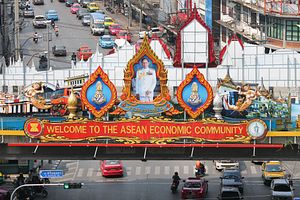One of the major projects of the Association of Southeast Asian Nations is the establishment of an ASEAN Economic Community, which aims to integrate Southeast Asia’s diverse economies, a region with 600 million people and a combined gross domestic product of $2.4 trillion. But several civil society organizations are moving to postpone the AEC and calling for a rethinking of its framework, which they claim is biased in favor of corporate interests and the traditional elite.
The AEC is defined by four pillars: Creating a single market and production base, increasing competitiveness, promoting equitable economic development, and further integrating ASEAN into the global economy. To synergize the region’s markets and production hubs, this would entail the free flow of goods, services, investments, capital, and skilled labor. Proponents argue that if the integration succeeds, the region could become the fourth largest economy in the next few years.
But for Philippines-based think-tank Ibon Foundation, the current model of the AEC could further impoverish the poor while facilitating the “aggressive foreign corporate takeovers of the region’s resources.” It added that overall, the AEC is detrimental to ordinary people because it will lead to an erosion of sovereignty, diminishing access to social services because of a stronger push for liberalization and privatization, greater inequalities between and within ASEAN countries, skewed labor mobility, job insecurity, increased land and other resource grabs, and the undermining of local small-scale farmers.
Ibon Foundation cited the investor-state dispute settlement provision of the AEC as an example of a one-sided protection measure in favor of corporate power, since it gives investors the right to sue government when their profits are in danger.
The research center warned that AEC could worsen the “uneven and inequitable economic growth” in Asia because it continues “old logic of the neoliberal model of development” characterized by “a race to the bottom in lowering labor, environmental and other regulatory standards and taxes, and in changing national laws to create a business-friendly environment.”
During the ASEAN People’s Forum recently held in Malaysia, various civil society organizations signed a statement echoing the concerns raised by Ibon Foundation. “The liberalization of the labour market has increased the number of precarious jobs and will continue to adversely impact the rights of workers,” an excerpt from the statement.
The groups rejected ASEAN’s development model for regional integration because it promotes “unequal trade and investment agreements negotiated and agreed to by member states (that) fail to guarantee redistributive, economic, gender, social and environmental justice, or accountability.”
As an alternative framework to the AEC, Ibon Foundation proposes that the integration must transform the ASEAN into a region that is “truly people-centered by abandoning the market-led growth strategy and focusing more on people’s concerns such as food sovereignty, climate change, and respect for human and collective rights.”
“Solidarity, cooperation and complementarity among states should be pursued instead of economic competition,” the group asserted.
And since the AEC is not yet fully implemented, civil society groups are urging for a more comprehensive and democratic consultation with all stakeholders so that negotiations about the proposed regional integration will not be restricted to government parties.
It is only by building a strong regional bloc with popular public support that ASEAN can successfully advance its agenda in the ongoing talks for greater economic cooperation in the Asia-Pacific such as the China-led Regional Comprehensive Economic Partnership and the US-led Trans-Pacific Partnership Agreement.
The AEC concept is an important one, and is needed to boost the region’s economic potential. But to repeat the recommendations made by Ibon Foundation and other civil society groups, this AEC must be reconceptualized to genuinely empower the people.

































